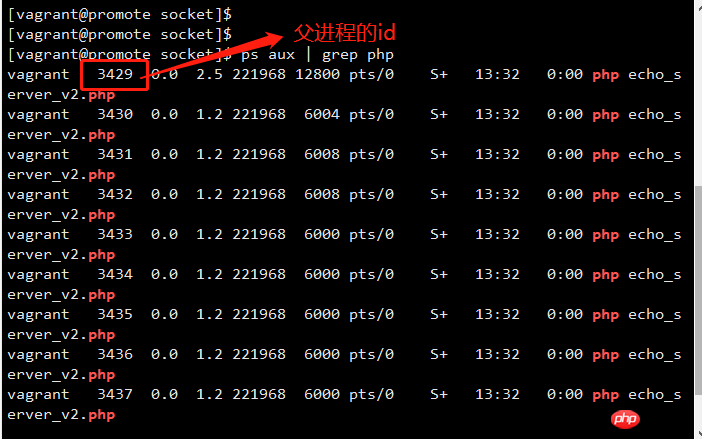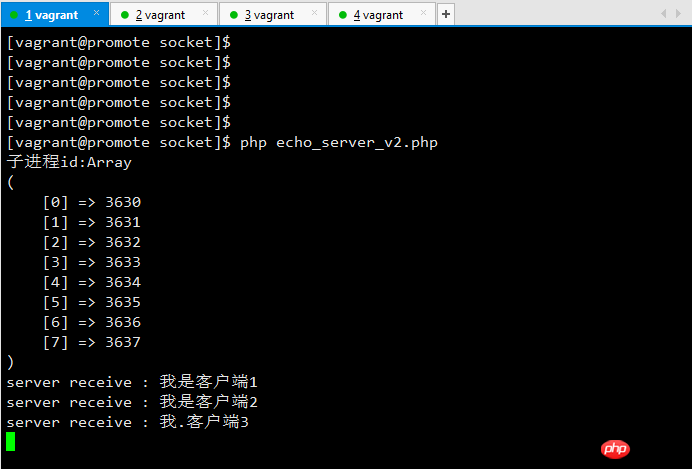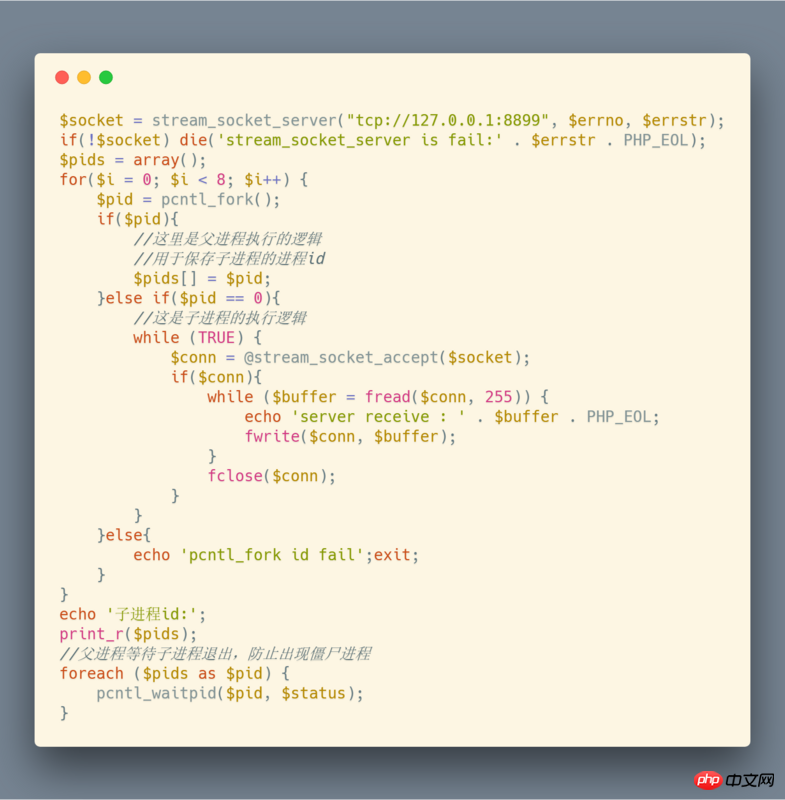 Backend Development
Backend Development
 PHP Tutorial
PHP Tutorial
 Detailed introduction of multi-process echo server in PHPSocket programming (picture and text)
Detailed introduction of multi-process echo server in PHPSocket programming (picture and text)
Detailed introduction of multi-process echo server in PHPSocket programming (picture and text)
This article brings you a detailed introduction (pictures and text) about the multi-process echo server in PHPSocket programming. It has certain reference value. Friends in need can refer to it. I hope it will be helpful to you. .
The last echo service program has a big shortcoming, that is, it can only connect to one client at the same time, which is obviously unreasonable.
So this time we use a multi-process approach to provide services to multiple clients at the same time.
The following is the final effect:

(The worker process we created can be viewed through the ps command)

(Open multiple terminals through xshell and connect multiple clients to the service program)
Begin coding Before, let’s introduce what a process is.
The process, that is, the running program that occupies memory, is an independent memory space. For example, when we open Notepad software on Windows, this operation is equivalent to opening a process.
Multi-process is to create multiple processes to complete one thing together.
We only need to implement the server-side program this time, and the client still uses the previous one. If you haven’t read the previous articles, you can check out the historical articles.
In PHP, we can use the pcntl_fork function to create a process.
The following is the prototype of the function:
int pcntl_fork ( void )
Official explanation:
When successful, the PID of the generated child process is returned in the execution thread of the parent process, and the PID of the child process is returned in the execution thread of the child process. Returns 0 within. On failure, -1 is returned in the parent process context, the child process is not created, and a PHP error is raised.
Why is it said to be the thread executed by the parent process? Because a process contains at least one thread, and this thread is the main thread of the process.
When the parent process calls pcntl_fork, it also copies an independent child process. This child process has the same context as the parent process. In other words, the two processes just share the same code.
Enter the encoding process:

By executing the pcntl_fork function, a child process is copied at the same time. At this time, if the context is The execution environment of the parent process, the return value is the process number of the child process. If it is the execution environment of a child process, 0 is returned. Therefore, in the following if program structure, both branches are executed.
The child process still has the same logic as before, used to receive messages from the client and send them to the client at the same time.
The penultimate line calls the pcntl_waitpid function. Before explaining this function, let us first understand what a zombie process is.
Under normal circumstances, the child process is created through the parent process. Since processes are independent memory structures, the parent process does not know the running status of the child process. After the child process completes its task, it cannot exit by itself. At this time, the parent process needs to obtain the status of the child process through the operating system to recycle the child process. Otherwise, our child process will become a garbage resource, that is, a zombie process.
The following is the function prototype of this function:
int pcntl_waitpid ( int $pid , int &$status [, int $options = 0 ] )
Official explanation:
Wait for or return the child process status of fork.
In fact, there is a problem with the above code. After calling pcntl_waitpid for the first time in foreach, the main process is actually blocked at this time, waiting for the first child process to exit, while other child processes If it exits abnormally at this time, it will not be recycled by the main process, and a zombie process will be generated. In actual development, the main process still has to do other things.
So the non-blocking method is recommended here. It is very simple. Just add the third parameter: WNOHANG. That is: pcntl_waitpid ($pid, $status, WNOHANG)
In this way, it can return immediately without the child process exiting, thus continuing to execute subsequent code.
Related recommendations:
Server-side PHP multi-process programming practice
Server-side PHP multi-process programming practice_PHP tutorial
The above is the detailed content of Detailed introduction of multi-process echo server in PHPSocket programming (picture and text). For more information, please follow other related articles on the PHP Chinese website!

Hot AI Tools

Undresser.AI Undress
AI-powered app for creating realistic nude photos

AI Clothes Remover
Online AI tool for removing clothes from photos.

Undress AI Tool
Undress images for free

Clothoff.io
AI clothes remover

Video Face Swap
Swap faces in any video effortlessly with our completely free AI face swap tool!

Hot Article

Hot Tools

Notepad++7.3.1
Easy-to-use and free code editor

SublimeText3 Chinese version
Chinese version, very easy to use

Zend Studio 13.0.1
Powerful PHP integrated development environment

Dreamweaver CS6
Visual web development tools

SublimeText3 Mac version
God-level code editing software (SublimeText3)

Hot Topics
 1662
1662
 14
14
 1418
1418
 52
52
 1311
1311
 25
25
 1261
1261
 29
29
 1234
1234
 24
24
 PHP and Python: Different Paradigms Explained
Apr 18, 2025 am 12:26 AM
PHP and Python: Different Paradigms Explained
Apr 18, 2025 am 12:26 AM
PHP is mainly procedural programming, but also supports object-oriented programming (OOP); Python supports a variety of paradigms, including OOP, functional and procedural programming. PHP is suitable for web development, and Python is suitable for a variety of applications such as data analysis and machine learning.
 Choosing Between PHP and Python: A Guide
Apr 18, 2025 am 12:24 AM
Choosing Between PHP and Python: A Guide
Apr 18, 2025 am 12:24 AM
PHP is suitable for web development and rapid prototyping, and Python is suitable for data science and machine learning. 1.PHP is used for dynamic web development, with simple syntax and suitable for rapid development. 2. Python has concise syntax, is suitable for multiple fields, and has a strong library ecosystem.
 Linux Architecture: Unveiling the 5 Basic Components
Apr 20, 2025 am 12:04 AM
Linux Architecture: Unveiling the 5 Basic Components
Apr 20, 2025 am 12:04 AM
The five basic components of the Linux system are: 1. Kernel, 2. System library, 3. System utilities, 4. Graphical user interface, 5. Applications. The kernel manages hardware resources, the system library provides precompiled functions, system utilities are used for system management, the GUI provides visual interaction, and applications use these components to implement functions.
 PHP and Python: A Deep Dive into Their History
Apr 18, 2025 am 12:25 AM
PHP and Python: A Deep Dive into Their History
Apr 18, 2025 am 12:25 AM
PHP originated in 1994 and was developed by RasmusLerdorf. It was originally used to track website visitors and gradually evolved into a server-side scripting language and was widely used in web development. Python was developed by Guidovan Rossum in the late 1980s and was first released in 1991. It emphasizes code readability and simplicity, and is suitable for scientific computing, data analysis and other fields.
 PHP's Impact: Web Development and Beyond
Apr 18, 2025 am 12:10 AM
PHP's Impact: Web Development and Beyond
Apr 18, 2025 am 12:10 AM
PHPhassignificantlyimpactedwebdevelopmentandextendsbeyondit.1)ItpowersmajorplatformslikeWordPressandexcelsindatabaseinteractions.2)PHP'sadaptabilityallowsittoscaleforlargeapplicationsusingframeworkslikeLaravel.3)Beyondweb,PHPisusedincommand-linescrip
 The Continued Use of PHP: Reasons for Its Endurance
Apr 19, 2025 am 12:23 AM
The Continued Use of PHP: Reasons for Its Endurance
Apr 19, 2025 am 12:23 AM
What’s still popular is the ease of use, flexibility and a strong ecosystem. 1) Ease of use and simple syntax make it the first choice for beginners. 2) Closely integrated with web development, excellent interaction with HTTP requests and database. 3) The huge ecosystem provides a wealth of tools and libraries. 4) Active community and open source nature adapts them to new needs and technology trends.
 How to check the warehouse address of git
Apr 17, 2025 pm 01:54 PM
How to check the warehouse address of git
Apr 17, 2025 pm 01:54 PM
To view the Git repository address, perform the following steps: 1. Open the command line and navigate to the repository directory; 2. Run the "git remote -v" command; 3. View the repository name in the output and its corresponding address.
 laravel installation code
Apr 18, 2025 pm 12:30 PM
laravel installation code
Apr 18, 2025 pm 12:30 PM
To install Laravel, follow these steps in sequence: Install Composer (for macOS/Linux and Windows) Install Laravel Installer Create a new project Start Service Access Application (URL: http://127.0.0.1:8000) Set up the database connection (if required)



